Leadership and Management for Service Industries Report Assessment
VerifiedAdded on 2023/01/23
|8
|2066
|54
Report
AI Summary
This report delves into the critical aspects of leadership and management within the service industry, focusing on the Wa-Pila hotel as a case study. It assesses the current hard and soft skills of managers, emphasizing the importance of emotional intelligence, communication, and innovation. The report also examines the future skills required, highlighting the impact of technology and the need for technical analytics, networking, and consistency. Furthermore, it compares and contrasts change management systems and leadership styles across different service organizations. The analysis provides insights into the importance of democratic leadership, employee empowerment, and the adaptation of technology to enhance customer service and achieve business goals. The report concludes by underscoring the significance of leadership and management in driving effective business operations and achieving organizational success.
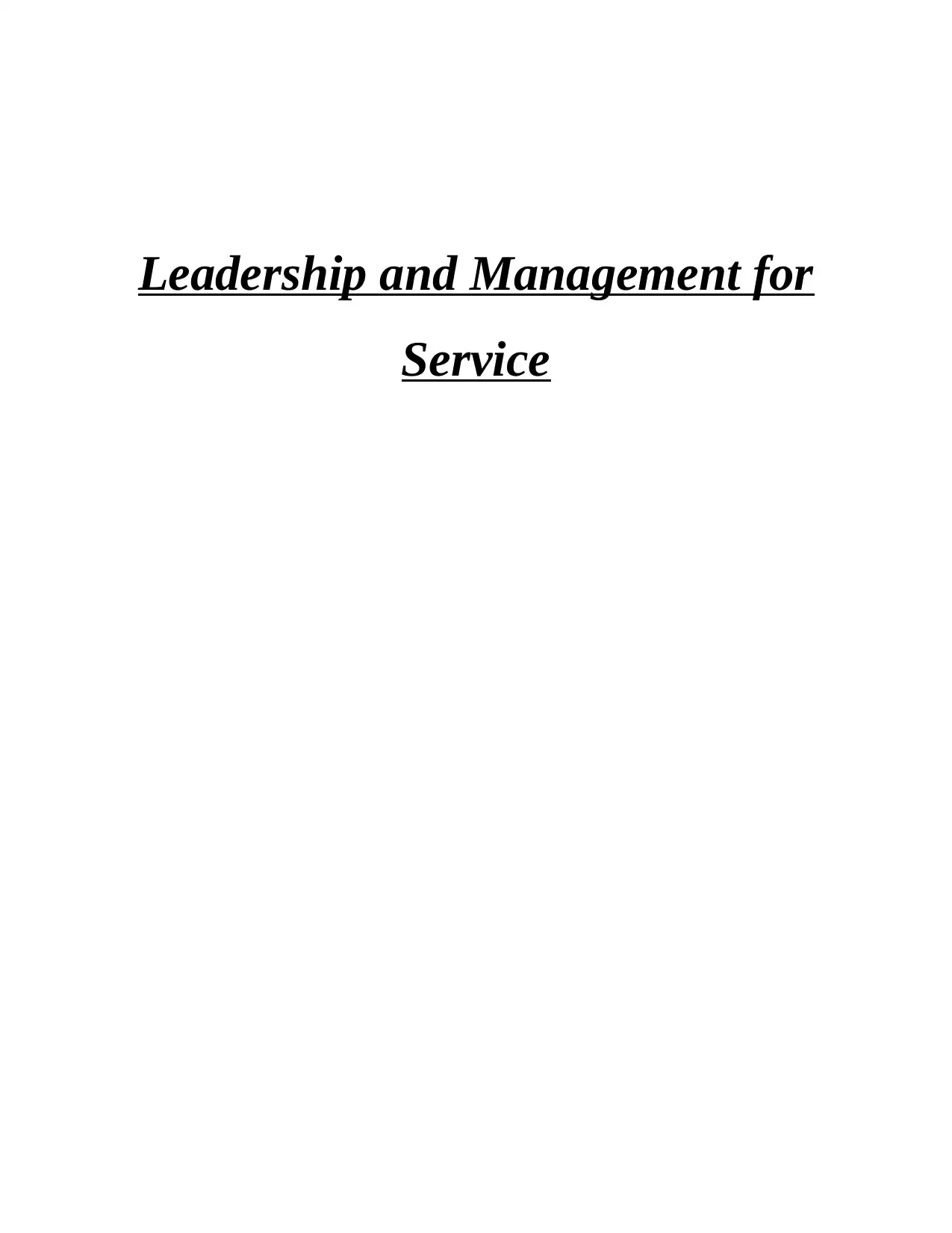
Leadership and Management for
Service
Service
Paraphrase This Document
Need a fresh take? Get an instant paraphrase of this document with our AI Paraphraser
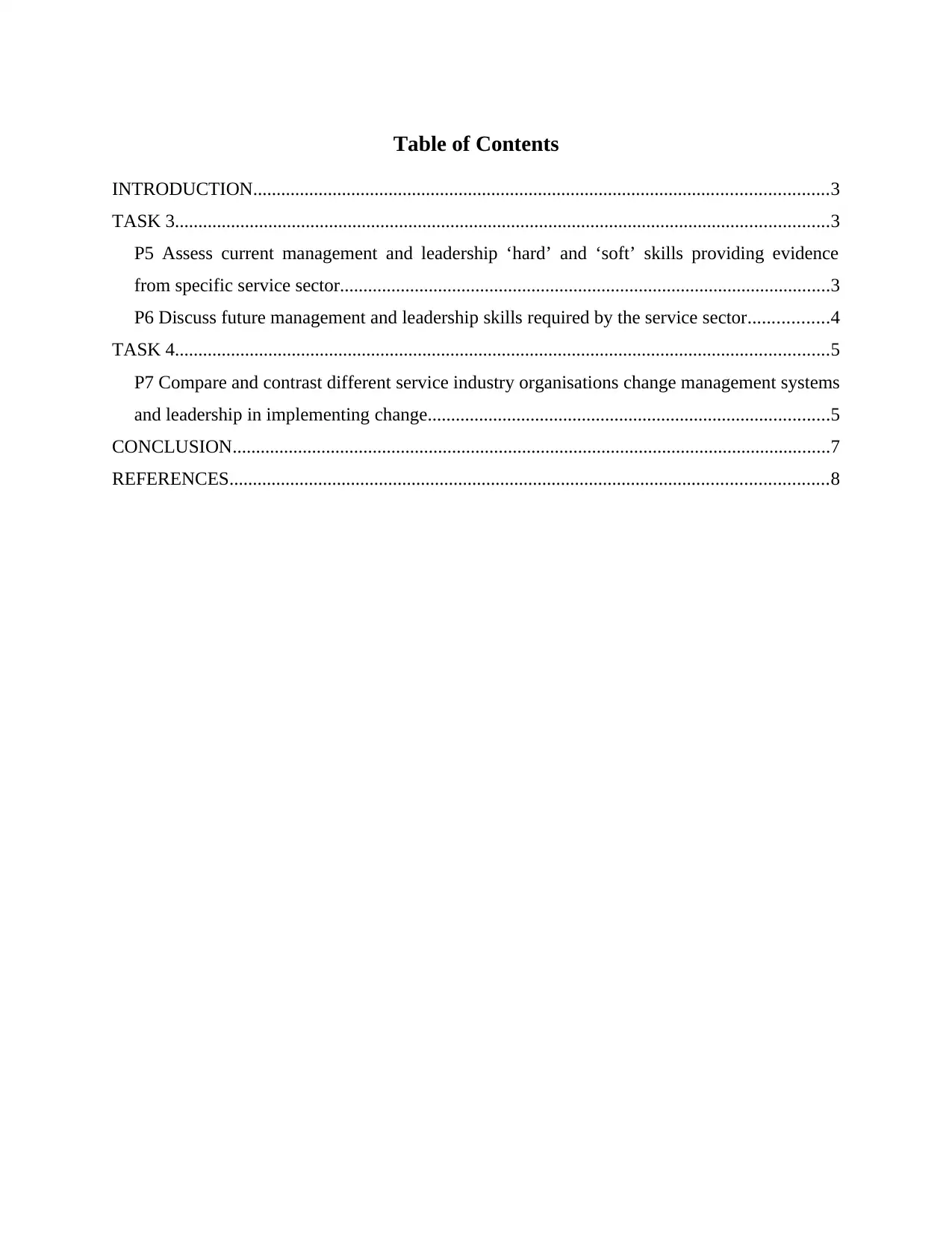
Table of Contents
INTRODUCTION...........................................................................................................................3
TASK 3............................................................................................................................................3
P5 Assess current management and leadership ‘hard’ and ‘soft’ skills providing evidence
from specific service sector.........................................................................................................3
P6 Discuss future management and leadership skills required by the service sector.................4
TASK 4............................................................................................................................................5
P7 Compare and contrast different service industry organisations change management systems
and leadership in implementing change......................................................................................5
CONCLUSION................................................................................................................................7
REFERENCES................................................................................................................................8
INTRODUCTION...........................................................................................................................3
TASK 3............................................................................................................................................3
P5 Assess current management and leadership ‘hard’ and ‘soft’ skills providing evidence
from specific service sector.........................................................................................................3
P6 Discuss future management and leadership skills required by the service sector.................4
TASK 4............................................................................................................................................5
P7 Compare and contrast different service industry organisations change management systems
and leadership in implementing change......................................................................................5
CONCLUSION................................................................................................................................7
REFERENCES................................................................................................................................8
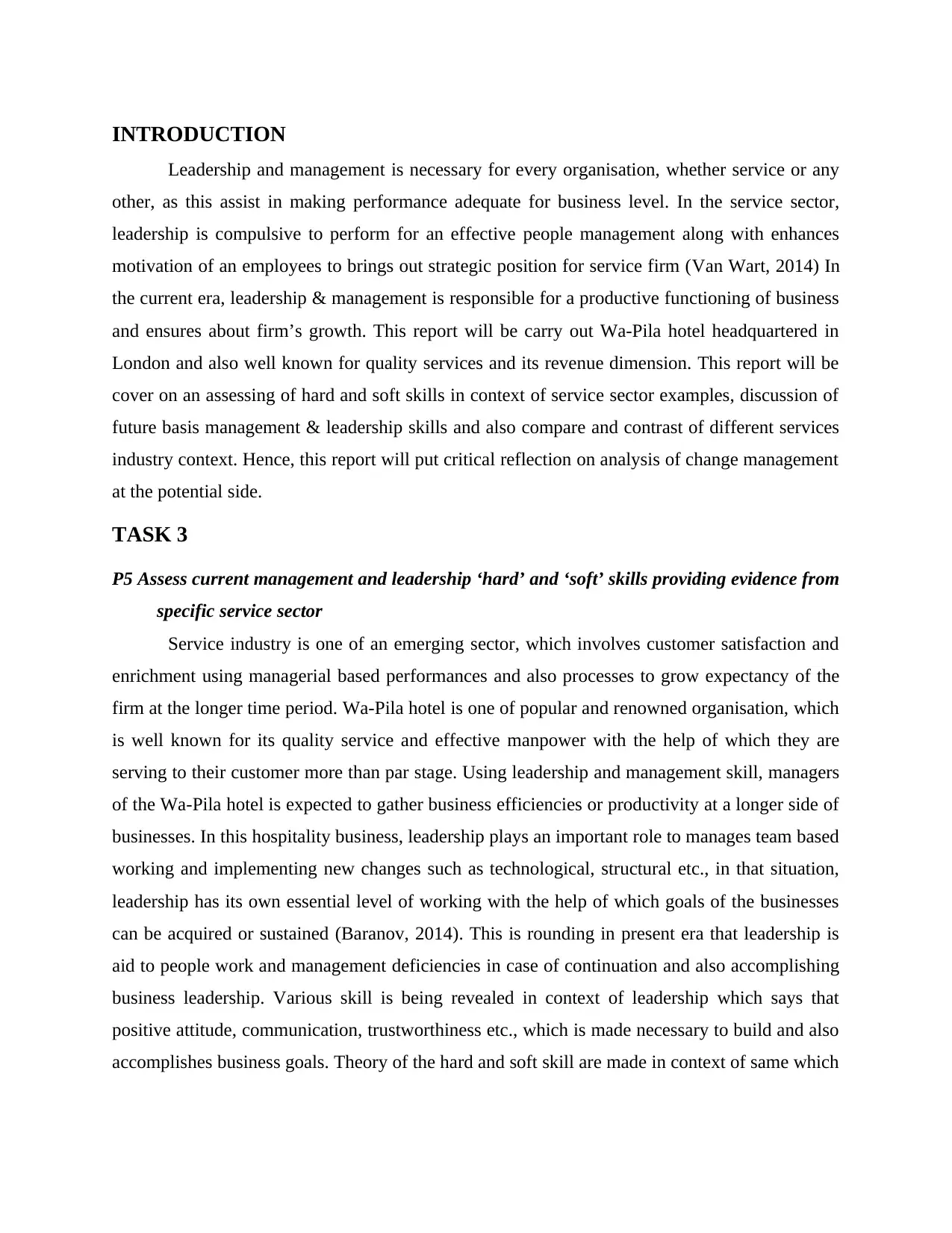
INTRODUCTION
Leadership and management is necessary for every organisation, whether service or any
other, as this assist in making performance adequate for business level. In the service sector,
leadership is compulsive to perform for an effective people management along with enhances
motivation of an employees to brings out strategic position for service firm (Van Wart, 2014) In
the current era, leadership & management is responsible for a productive functioning of business
and ensures about firm’s growth. This report will be carry out Wa-Pila hotel headquartered in
London and also well known for quality services and its revenue dimension. This report will be
cover on an assessing of hard and soft skills in context of service sector examples, discussion of
future basis management & leadership skills and also compare and contrast of different services
industry context. Hence, this report will put critical reflection on analysis of change management
at the potential side.
TASK 3
P5 Assess current management and leadership ‘hard’ and ‘soft’ skills providing evidence from
specific service sector
Service industry is one of an emerging sector, which involves customer satisfaction and
enrichment using managerial based performances and also processes to grow expectancy of the
firm at the longer time period. Wa-Pila hotel is one of popular and renowned organisation, which
is well known for its quality service and effective manpower with the help of which they are
serving to their customer more than par stage. Using leadership and management skill, managers
of the Wa-Pila hotel is expected to gather business efficiencies or productivity at a longer side of
businesses. In this hospitality business, leadership plays an important role to manages team based
working and implementing new changes such as technological, structural etc., in that situation,
leadership has its own essential level of working with the help of which goals of the businesses
can be acquired or sustained (Baranov, 2014). This is rounding in present era that leadership is
aid to people work and management deficiencies in case of continuation and also accomplishing
business leadership. Various skill is being revealed in context of leadership which says that
positive attitude, communication, trustworthiness etc., which is made necessary to build and also
accomplishes business goals. Theory of the hard and soft skill are made in context of same which
Leadership and management is necessary for every organisation, whether service or any
other, as this assist in making performance adequate for business level. In the service sector,
leadership is compulsive to perform for an effective people management along with enhances
motivation of an employees to brings out strategic position for service firm (Van Wart, 2014) In
the current era, leadership & management is responsible for a productive functioning of business
and ensures about firm’s growth. This report will be carry out Wa-Pila hotel headquartered in
London and also well known for quality services and its revenue dimension. This report will be
cover on an assessing of hard and soft skills in context of service sector examples, discussion of
future basis management & leadership skills and also compare and contrast of different services
industry context. Hence, this report will put critical reflection on analysis of change management
at the potential side.
TASK 3
P5 Assess current management and leadership ‘hard’ and ‘soft’ skills providing evidence from
specific service sector
Service industry is one of an emerging sector, which involves customer satisfaction and
enrichment using managerial based performances and also processes to grow expectancy of the
firm at the longer time period. Wa-Pila hotel is one of popular and renowned organisation, which
is well known for its quality service and effective manpower with the help of which they are
serving to their customer more than par stage. Using leadership and management skill, managers
of the Wa-Pila hotel is expected to gather business efficiencies or productivity at a longer side of
businesses. In this hospitality business, leadership plays an important role to manages team based
working and implementing new changes such as technological, structural etc., in that situation,
leadership has its own essential level of working with the help of which goals of the businesses
can be acquired or sustained (Baranov, 2014). This is rounding in present era that leadership is
aid to people work and management deficiencies in case of continuation and also accomplishing
business leadership. Various skill is being revealed in context of leadership which says that
positive attitude, communication, trustworthiness etc., which is made necessary to build and also
accomplishes business goals. Theory of the hard and soft skill are made in context of same which
⊘ This is a preview!⊘
Do you want full access?
Subscribe today to unlock all pages.

Trusted by 1+ million students worldwide
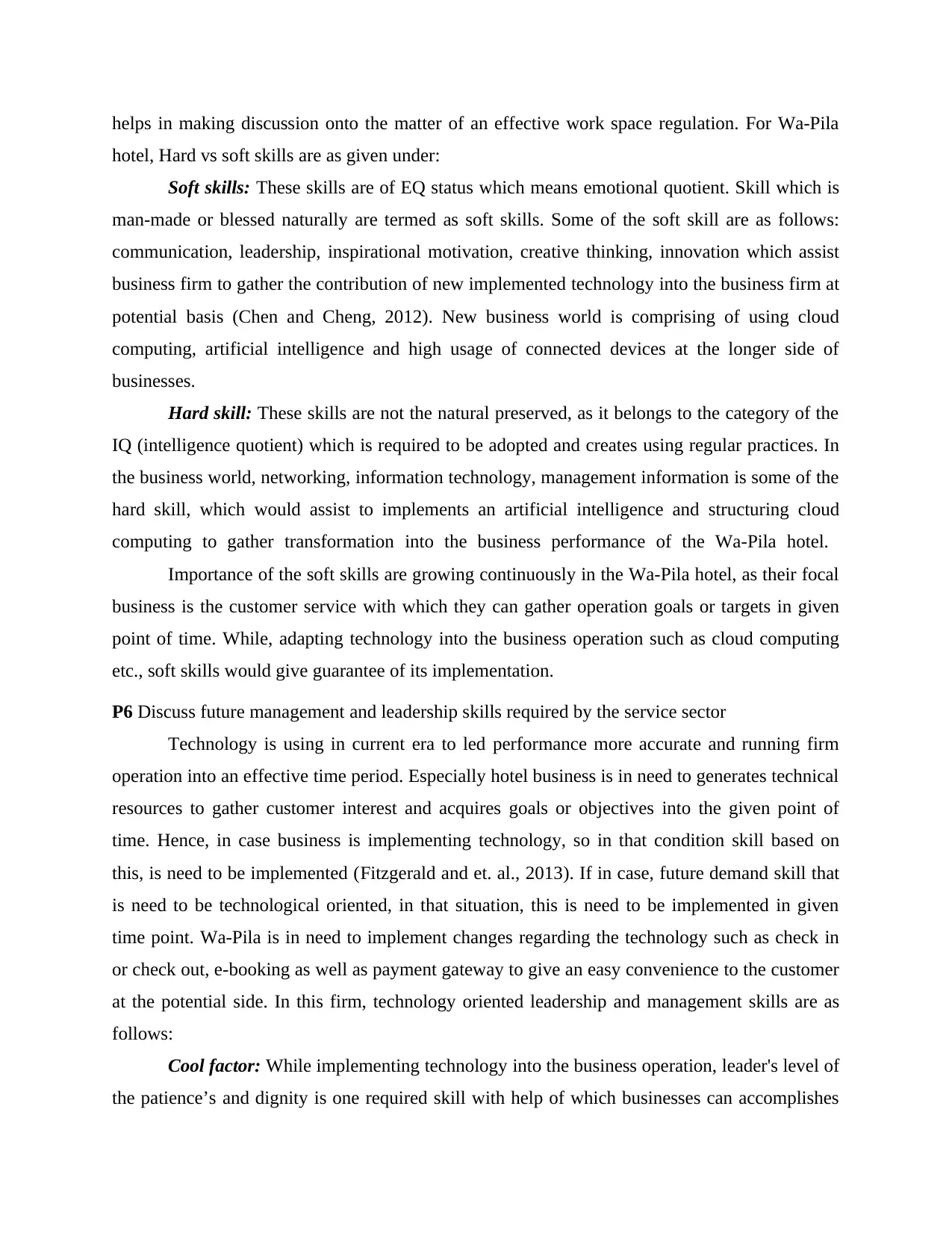
helps in making discussion onto the matter of an effective work space regulation. For Wa-Pila
hotel, Hard vs soft skills are as given under:
Soft skills: These skills are of EQ status which means emotional quotient. Skill which is
man-made or blessed naturally are termed as soft skills. Some of the soft skill are as follows:
communication, leadership, inspirational motivation, creative thinking, innovation which assist
business firm to gather the contribution of new implemented technology into the business firm at
potential basis (Chen and Cheng, 2012). New business world is comprising of using cloud
computing, artificial intelligence and high usage of connected devices at the longer side of
businesses.
Hard skill: These skills are not the natural preserved, as it belongs to the category of the
IQ (intelligence quotient) which is required to be adopted and creates using regular practices. In
the business world, networking, information technology, management information is some of the
hard skill, which would assist to implements an artificial intelligence and structuring cloud
computing to gather transformation into the business performance of the Wa-Pila hotel.
Importance of the soft skills are growing continuously in the Wa-Pila hotel, as their focal
business is the customer service with which they can gather operation goals or targets in given
point of time. While, adapting technology into the business operation such as cloud computing
etc., soft skills would give guarantee of its implementation.
P6 Discuss future management and leadership skills required by the service sector
Technology is using in current era to led performance more accurate and running firm
operation into an effective time period. Especially hotel business is in need to generates technical
resources to gather customer interest and acquires goals or objectives into the given point of
time. Hence, in case business is implementing technology, so in that condition skill based on
this, is need to be implemented (Fitzgerald and et. al., 2013). If in case, future demand skill that
is need to be technological oriented, in that situation, this is need to be implemented in given
time point. Wa-Pila is in need to implement changes regarding the technology such as check in
or check out, e-booking as well as payment gateway to give an easy convenience to the customer
at the potential side. In this firm, technology oriented leadership and management skills are as
follows:
Cool factor: While implementing technology into the business operation, leader's level of
the patience’s and dignity is one required skill with help of which businesses can accomplishes
hotel, Hard vs soft skills are as given under:
Soft skills: These skills are of EQ status which means emotional quotient. Skill which is
man-made or blessed naturally are termed as soft skills. Some of the soft skill are as follows:
communication, leadership, inspirational motivation, creative thinking, innovation which assist
business firm to gather the contribution of new implemented technology into the business firm at
potential basis (Chen and Cheng, 2012). New business world is comprising of using cloud
computing, artificial intelligence and high usage of connected devices at the longer side of
businesses.
Hard skill: These skills are not the natural preserved, as it belongs to the category of the
IQ (intelligence quotient) which is required to be adopted and creates using regular practices. In
the business world, networking, information technology, management information is some of the
hard skill, which would assist to implements an artificial intelligence and structuring cloud
computing to gather transformation into the business performance of the Wa-Pila hotel.
Importance of the soft skills are growing continuously in the Wa-Pila hotel, as their focal
business is the customer service with which they can gather operation goals or targets in given
point of time. While, adapting technology into the business operation such as cloud computing
etc., soft skills would give guarantee of its implementation.
P6 Discuss future management and leadership skills required by the service sector
Technology is using in current era to led performance more accurate and running firm
operation into an effective time period. Especially hotel business is in need to generates technical
resources to gather customer interest and acquires goals or objectives into the given point of
time. Hence, in case business is implementing technology, so in that condition skill based on
this, is need to be implemented (Fitzgerald and et. al., 2013). If in case, future demand skill that
is need to be technological oriented, in that situation, this is need to be implemented in given
time point. Wa-Pila is in need to implement changes regarding the technology such as check in
or check out, e-booking as well as payment gateway to give an easy convenience to the customer
at the potential side. In this firm, technology oriented leadership and management skills are as
follows:
Cool factor: While implementing technology into the business operation, leader's level of
the patience’s and dignity is one required skill with help of which businesses can accomplishes
Paraphrase This Document
Need a fresh take? Get an instant paraphrase of this document with our AI Paraphraser
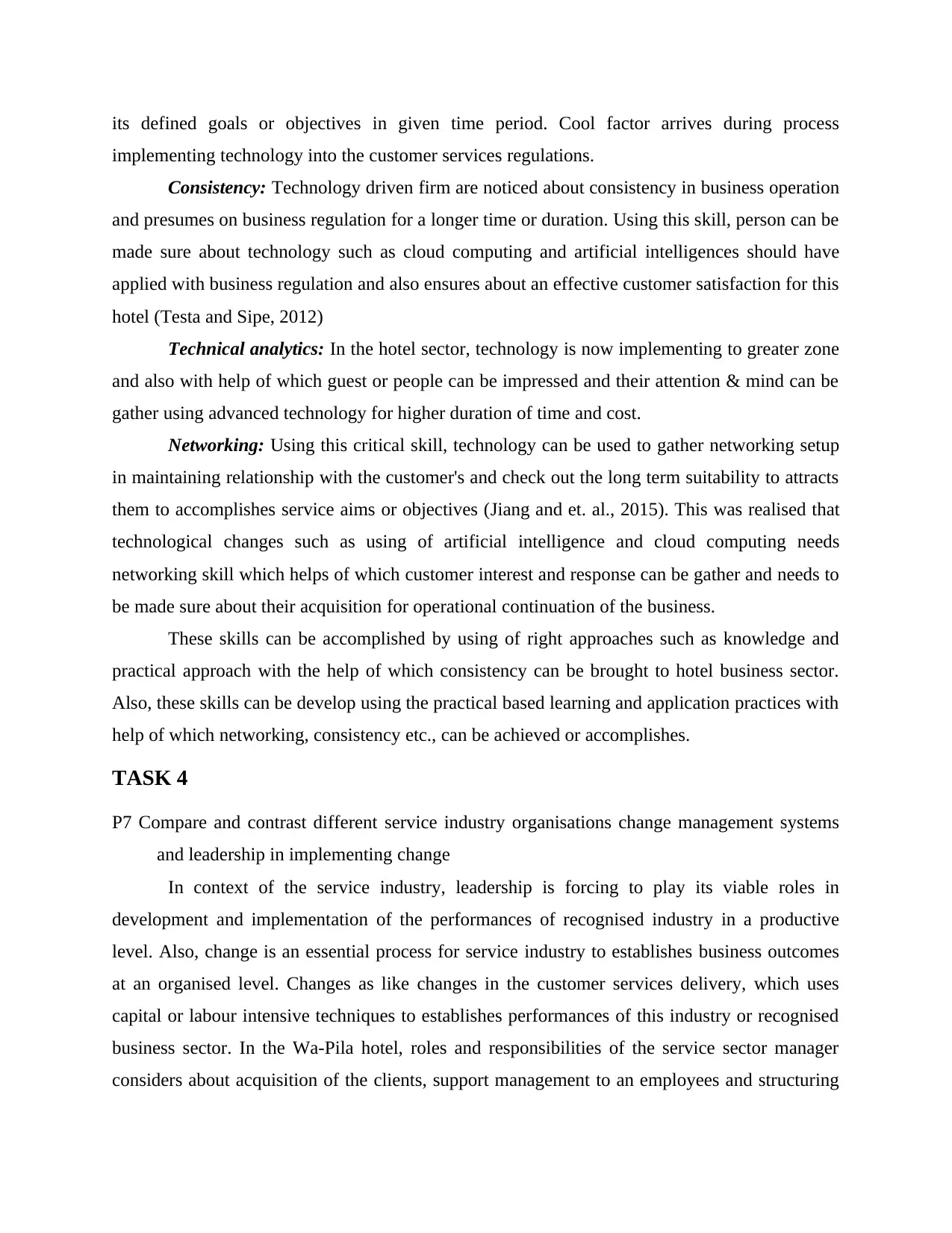
its defined goals or objectives in given time period. Cool factor arrives during process
implementing technology into the customer services regulations.
Consistency: Technology driven firm are noticed about consistency in business operation
and presumes on business regulation for a longer time or duration. Using this skill, person can be
made sure about technology such as cloud computing and artificial intelligences should have
applied with business regulation and also ensures about an effective customer satisfaction for this
hotel (Testa and Sipe, 2012)
Technical analytics: In the hotel sector, technology is now implementing to greater zone
and also with help of which guest or people can be impressed and their attention & mind can be
gather using advanced technology for higher duration of time and cost.
Networking: Using this critical skill, technology can be used to gather networking setup
in maintaining relationship with the customer's and check out the long term suitability to attracts
them to accomplishes service aims or objectives (Jiang and et. al., 2015). This was realised that
technological changes such as using of artificial intelligence and cloud computing needs
networking skill which helps of which customer interest and response can be gather and needs to
be made sure about their acquisition for operational continuation of the business.
These skills can be accomplished by using of right approaches such as knowledge and
practical approach with the help of which consistency can be brought to hotel business sector.
Also, these skills can be develop using the practical based learning and application practices with
help of which networking, consistency etc., can be achieved or accomplishes.
TASK 4
P7 Compare and contrast different service industry organisations change management systems
and leadership in implementing change
In context of the service industry, leadership is forcing to play its viable roles in
development and implementation of the performances of recognised industry in a productive
level. Also, change is an essential process for service industry to establishes business outcomes
at an organised level. Changes as like changes in the customer services delivery, which uses
capital or labour intensive techniques to establishes performances of this industry or recognised
business sector. In the Wa-Pila hotel, roles and responsibilities of the service sector manager
considers about acquisition of the clients, support management to an employees and structuring
implementing technology into the customer services regulations.
Consistency: Technology driven firm are noticed about consistency in business operation
and presumes on business regulation for a longer time or duration. Using this skill, person can be
made sure about technology such as cloud computing and artificial intelligences should have
applied with business regulation and also ensures about an effective customer satisfaction for this
hotel (Testa and Sipe, 2012)
Technical analytics: In the hotel sector, technology is now implementing to greater zone
and also with help of which guest or people can be impressed and their attention & mind can be
gather using advanced technology for higher duration of time and cost.
Networking: Using this critical skill, technology can be used to gather networking setup
in maintaining relationship with the customer's and check out the long term suitability to attracts
them to accomplishes service aims or objectives (Jiang and et. al., 2015). This was realised that
technological changes such as using of artificial intelligence and cloud computing needs
networking skill which helps of which customer interest and response can be gather and needs to
be made sure about their acquisition for operational continuation of the business.
These skills can be accomplished by using of right approaches such as knowledge and
practical approach with the help of which consistency can be brought to hotel business sector.
Also, these skills can be develop using the practical based learning and application practices with
help of which networking, consistency etc., can be achieved or accomplishes.
TASK 4
P7 Compare and contrast different service industry organisations change management systems
and leadership in implementing change
In context of the service industry, leadership is forcing to play its viable roles in
development and implementation of the performances of recognised industry in a productive
level. Also, change is an essential process for service industry to establishes business outcomes
at an organised level. Changes as like changes in the customer services delivery, which uses
capital or labour intensive techniques to establishes performances of this industry or recognised
business sector. In the Wa-Pila hotel, roles and responsibilities of the service sector manager
considers about acquisition of the clients, support management to an employees and structuring
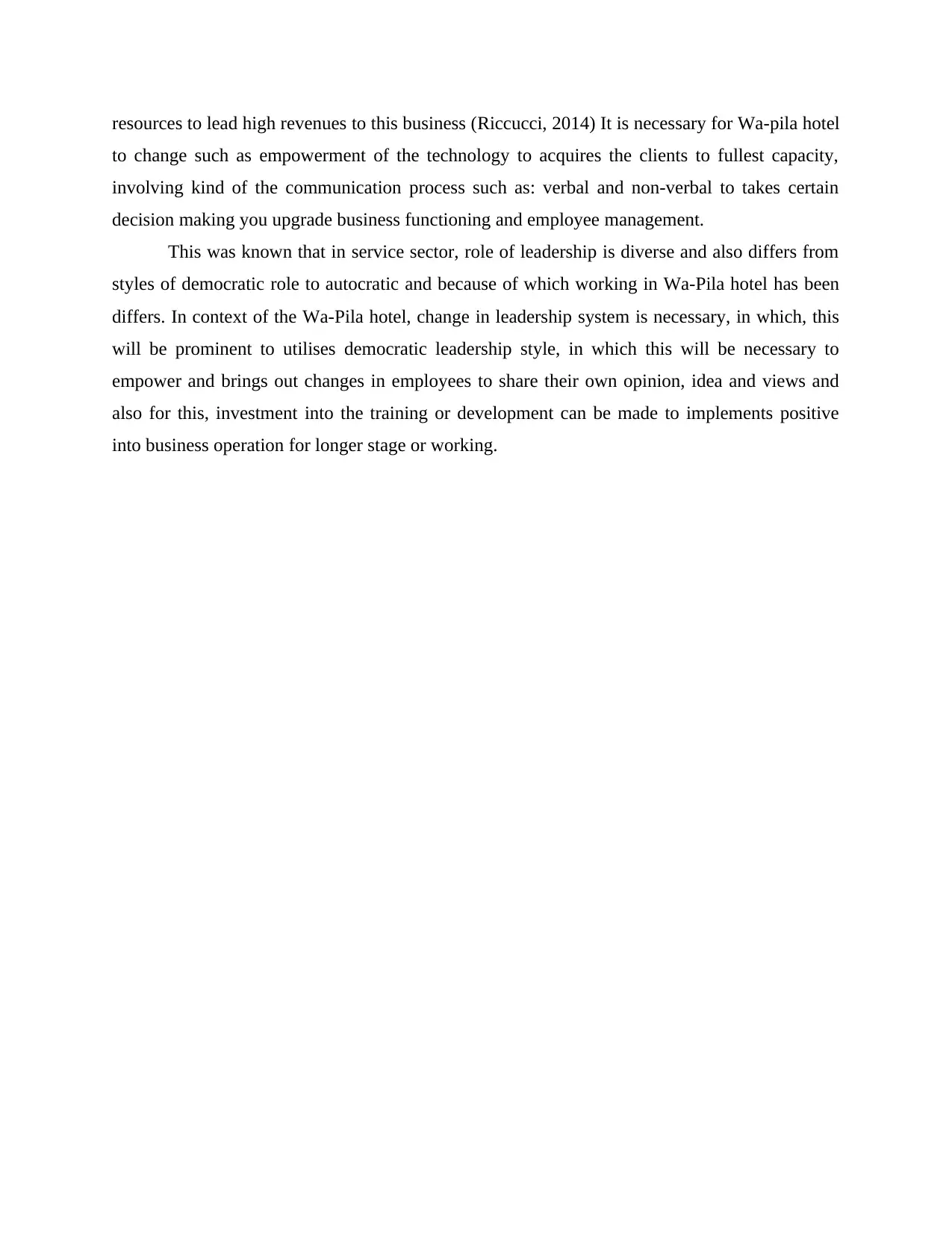
resources to lead high revenues to this business (Riccucci, 2014) It is necessary for Wa-pila hotel
to change such as empowerment of the technology to acquires the clients to fullest capacity,
involving kind of the communication process such as: verbal and non-verbal to takes certain
decision making you upgrade business functioning and employee management.
This was known that in service sector, role of leadership is diverse and also differs from
styles of democratic role to autocratic and because of which working in Wa-Pila hotel has been
differs. In context of the Wa-Pila hotel, change in leadership system is necessary, in which, this
will be prominent to utilises democratic leadership style, in which this will be necessary to
empower and brings out changes in employees to share their own opinion, idea and views and
also for this, investment into the training or development can be made to implements positive
into business operation for longer stage or working.
to change such as empowerment of the technology to acquires the clients to fullest capacity,
involving kind of the communication process such as: verbal and non-verbal to takes certain
decision making you upgrade business functioning and employee management.
This was known that in service sector, role of leadership is diverse and also differs from
styles of democratic role to autocratic and because of which working in Wa-Pila hotel has been
differs. In context of the Wa-Pila hotel, change in leadership system is necessary, in which, this
will be prominent to utilises democratic leadership style, in which this will be necessary to
empower and brings out changes in employees to share their own opinion, idea and views and
also for this, investment into the training or development can be made to implements positive
into business operation for longer stage or working.
⊘ This is a preview!⊘
Do you want full access?
Subscribe today to unlock all pages.

Trusted by 1+ million students worldwide
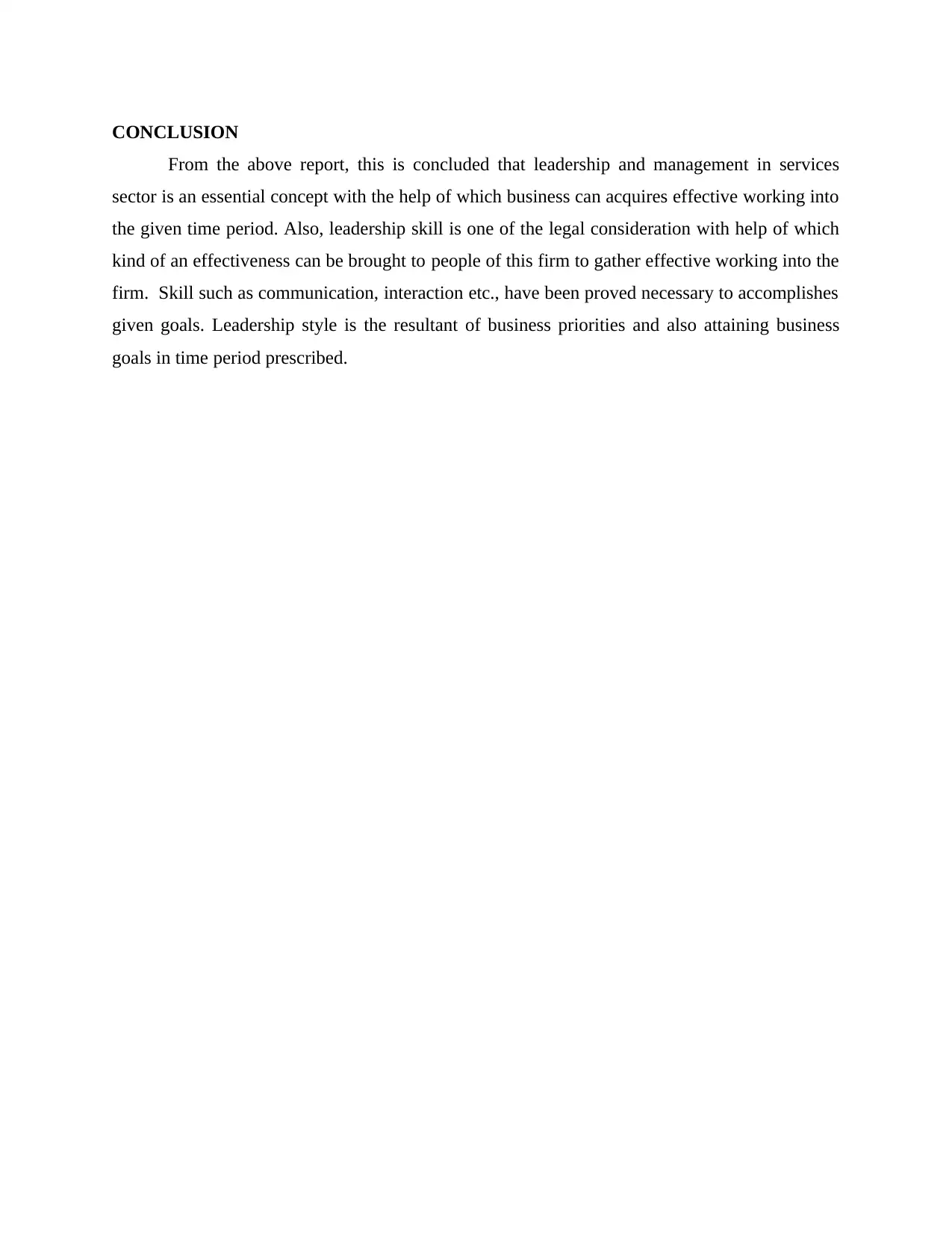
CONCLUSION
From the above report, this is concluded that leadership and management in services
sector is an essential concept with the help of which business can acquires effective working into
the given time period. Also, leadership skill is one of the legal consideration with help of which
kind of an effectiveness can be brought to people of this firm to gather effective working into the
firm. Skill such as communication, interaction etc., have been proved necessary to accomplishes
given goals. Leadership style is the resultant of business priorities and also attaining business
goals in time period prescribed.
From the above report, this is concluded that leadership and management in services
sector is an essential concept with the help of which business can acquires effective working into
the given time period. Also, leadership skill is one of the legal consideration with help of which
kind of an effectiveness can be brought to people of this firm to gather effective working into the
firm. Skill such as communication, interaction etc., have been proved necessary to accomplishes
given goals. Leadership style is the resultant of business priorities and also attaining business
goals in time period prescribed.
Paraphrase This Document
Need a fresh take? Get an instant paraphrase of this document with our AI Paraphraser
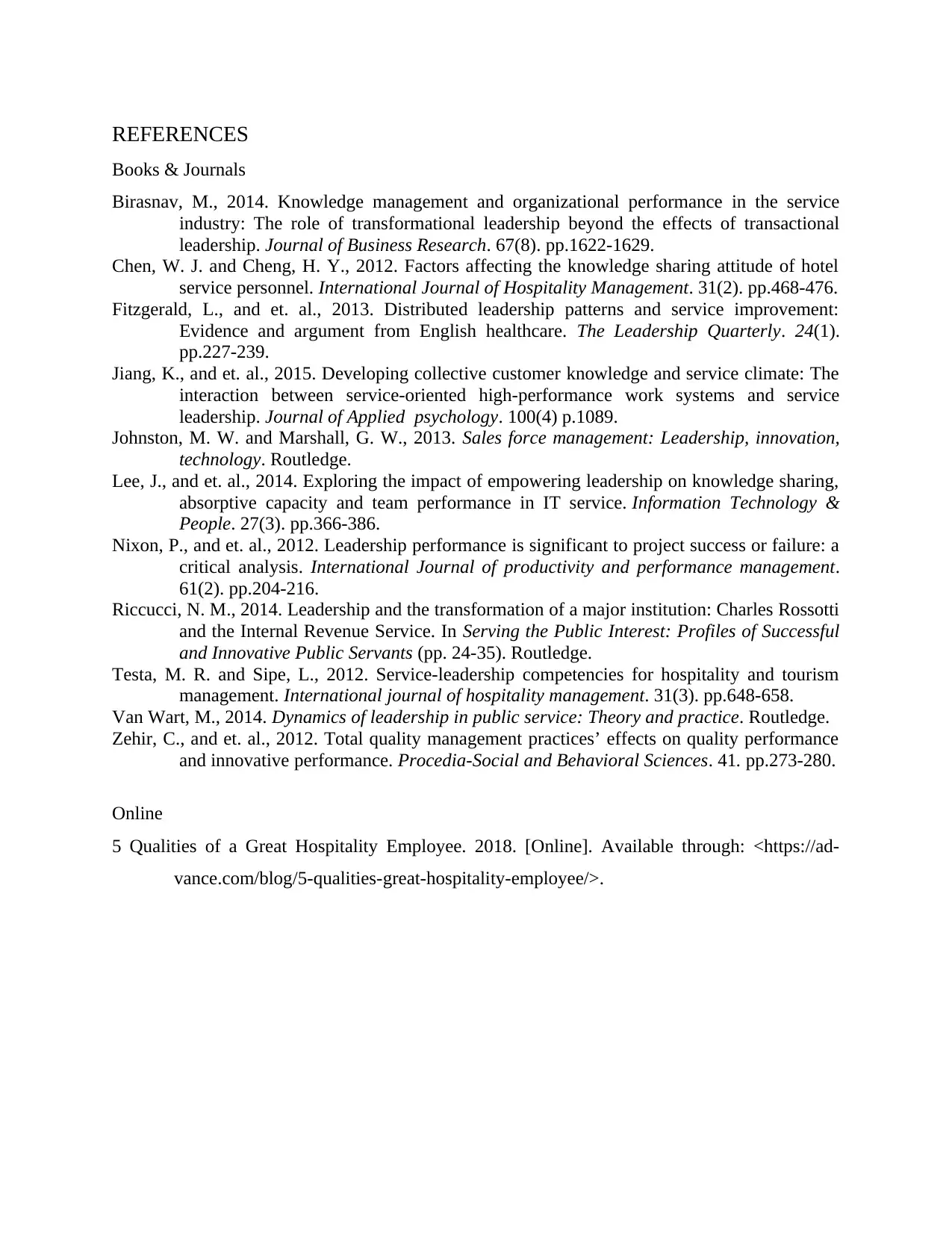
REFERENCES
Books & Journals
Birasnav, M., 2014. Knowledge management and organizational performance in the service
industry: The role of transformational leadership beyond the effects of transactional
leadership. Journal of Business Research. 67(8). pp.1622-1629.
Chen, W. J. and Cheng, H. Y., 2012. Factors affecting the knowledge sharing attitude of hotel
service personnel. International Journal of Hospitality Management. 31(2). pp.468-476.
Fitzgerald, L., and et. al., 2013. Distributed leadership patterns and service improvement:
Evidence and argument from English healthcare. The Leadership Quarterly. 24(1).
pp.227-239.
Jiang, K., and et. al., 2015. Developing collective customer knowledge and service climate: The
interaction between service-oriented high-performance work systems and service
leadership. Journal of Applied psychology. 100(4) p.1089.
Johnston, M. W. and Marshall, G. W., 2013. Sales force management: Leadership, innovation,
technology. Routledge.
Lee, J., and et. al., 2014. Exploring the impact of empowering leadership on knowledge sharing,
absorptive capacity and team performance in IT service. Information Technology &
People. 27(3). pp.366-386.
Nixon, P., and et. al., 2012. Leadership performance is significant to project success or failure: a
critical analysis. International Journal of productivity and performance management.
61(2). pp.204-216.
Riccucci, N. M., 2014. Leadership and the transformation of a major institution: Charles Rossotti
and the Internal Revenue Service. In Serving the Public Interest: Profiles of Successful
and Innovative Public Servants (pp. 24-35). Routledge.
Testa, M. R. and Sipe, L., 2012. Service-leadership competencies for hospitality and tourism
management. International journal of hospitality management. 31(3). pp.648-658.
Van Wart, M., 2014. Dynamics of leadership in public service: Theory and practice. Routledge.
Zehir, C., and et. al., 2012. Total quality management practices’ effects on quality performance
and innovative performance. Procedia-Social and Behavioral Sciences. 41. pp.273-280.
Online
5 Qualities of a Great Hospitality Employee. 2018. [Online]. Available through: <https://ad-
vance.com/blog/5-qualities-great-hospitality-employee/>.
Books & Journals
Birasnav, M., 2014. Knowledge management and organizational performance in the service
industry: The role of transformational leadership beyond the effects of transactional
leadership. Journal of Business Research. 67(8). pp.1622-1629.
Chen, W. J. and Cheng, H. Y., 2012. Factors affecting the knowledge sharing attitude of hotel
service personnel. International Journal of Hospitality Management. 31(2). pp.468-476.
Fitzgerald, L., and et. al., 2013. Distributed leadership patterns and service improvement:
Evidence and argument from English healthcare. The Leadership Quarterly. 24(1).
pp.227-239.
Jiang, K., and et. al., 2015. Developing collective customer knowledge and service climate: The
interaction between service-oriented high-performance work systems and service
leadership. Journal of Applied psychology. 100(4) p.1089.
Johnston, M. W. and Marshall, G. W., 2013. Sales force management: Leadership, innovation,
technology. Routledge.
Lee, J., and et. al., 2014. Exploring the impact of empowering leadership on knowledge sharing,
absorptive capacity and team performance in IT service. Information Technology &
People. 27(3). pp.366-386.
Nixon, P., and et. al., 2012. Leadership performance is significant to project success or failure: a
critical analysis. International Journal of productivity and performance management.
61(2). pp.204-216.
Riccucci, N. M., 2014. Leadership and the transformation of a major institution: Charles Rossotti
and the Internal Revenue Service. In Serving the Public Interest: Profiles of Successful
and Innovative Public Servants (pp. 24-35). Routledge.
Testa, M. R. and Sipe, L., 2012. Service-leadership competencies for hospitality and tourism
management. International journal of hospitality management. 31(3). pp.648-658.
Van Wart, M., 2014. Dynamics of leadership in public service: Theory and practice. Routledge.
Zehir, C., and et. al., 2012. Total quality management practices’ effects on quality performance
and innovative performance. Procedia-Social and Behavioral Sciences. 41. pp.273-280.
Online
5 Qualities of a Great Hospitality Employee. 2018. [Online]. Available through: <https://ad-
vance.com/blog/5-qualities-great-hospitality-employee/>.
1 out of 8
Related Documents
Your All-in-One AI-Powered Toolkit for Academic Success.
+13062052269
info@desklib.com
Available 24*7 on WhatsApp / Email
![[object Object]](/_next/static/media/star-bottom.7253800d.svg)
Unlock your academic potential
Copyright © 2020–2025 A2Z Services. All Rights Reserved. Developed and managed by ZUCOL.





